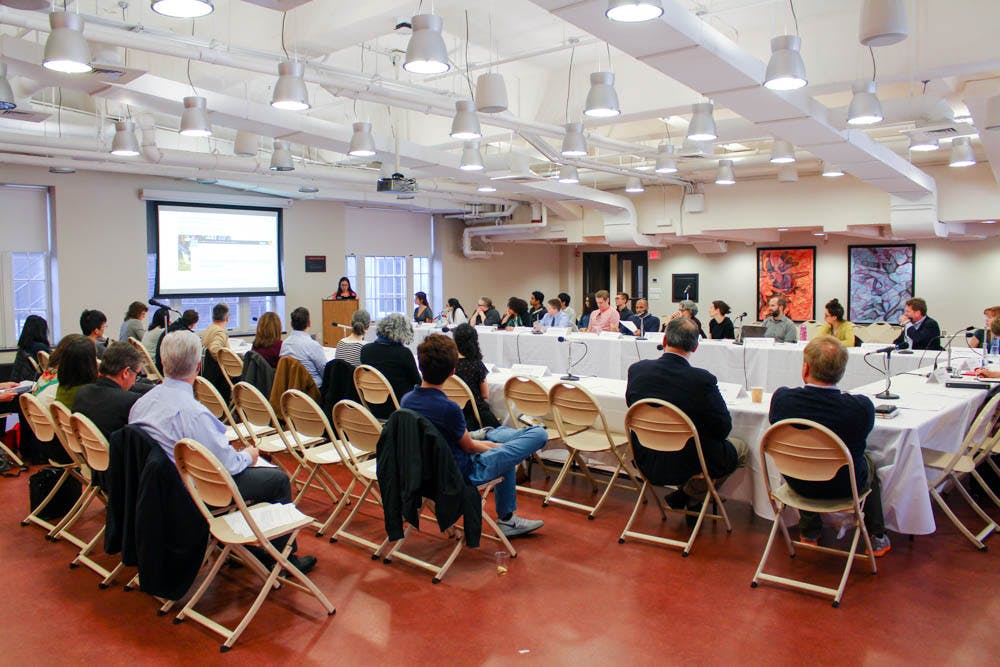Students proposed a resolution aiming to create a Fair Food Committee that would set environment and labor standards for food products across campus at Tuesday’s Brown University Community Council meeting.
Kirsten Wolfe, associate dean of students and assistant director of Student Conduct and Community Standards, also proposed changes to the Code of Student Conduct at the meeting.
The Fair Food Resolution, introduced by Camila Rice-Aguilar ’21, Emily Ma ’21 and Vanesa Mora ’21, features four goals: establish a Fair Food Committee of students and faculty, ensure products across campus meet the committee’s standards, increase social advocacy on this issue within the University and pass a resolution reflecting the University’s commitment to these goals.
The University has previously addressed food awareness efforts proposed by students, but there is more work to be done, Mora said. The impact of the 2008 Real Food Campaign — a previous effort by University students to increase transparency regarding food information — peaked in 2013 but has since dwindled, she added. Additionally, Brown Dining Services previously agreed to raise their proportion of fair trade certified bananas to 40 percent, but ran into quality control issues thereafter, according to Rice-Aguilar.
Ma proposed ideas the Fair Food Committee could implement to maintain a strong influence over the University’s food systems. She suggested measures such as the annual publication of information about the University’s food suppliers, contracting decisions and social impacts. In addition, she recommended creating a third-party multi-stakeholder committee by the end of the semester to foster dialogue, efficiency and continued success.
In the students’ closing remarks, Rice-Aguilar highlighted the wide-reaching impacts the resolution could have for the University and beyond. “We recognize that Brown is a leader,” Rice-Aguilar said. “It’s imperative, now more than ever, to become part of this national movement toward more sustainable and ethical food purchases. We can utilize our privilege and simple purchasing power to really create (a) huge effect.”
Following the students’ proposal, Wolfe presented on prospective revisions to the University’s current Code of Student Conduct. Wolfe has been working directly with the committee tasked with a re-draft. The University’s Student Conduct mission statement currently emphasizes social justice, an area not many other offices of Student Conduct underscore nationwide, she said. Wolfe and the committee maintained this emphasis on social justice in their proposed changes.
The committee proposed supplementing the traditional justice approach with a restorative justice approach. This implementation would “lead to more student growth and learning,” Wolfe said. “While a traditional justice approach revolves around the questions of ‘What rule was broken? Who did it? What do they deserve as a consequence?’, a restorative justice approach aims to ask and answer the questions of ‘What harm was caused? What do the harmed parties need? Whose obligation is it to meet those needs?’”
Students would need to take active accountability to shape their disciplinary outcome under this approach. The restorative measure will “lead to agreements that are heavy on learning and repair and less focused on punitive measures,” Wolfe said. Though outcomes “might not look the same for two students who did the same kind of behavior,” the restorative justice approach will focus on the needs of the harmed party, so “it is going to require a shift in …what constitutes fairness.”
Wolfe also discussed two other revisions to the Code of Student Conduct. She proposed more solidified disciplinary measures for students who participate in de-recognized organizations, and suggested conduct code documents for the individuals be separated from those for the student organizations. Additionally, the committee proposed solidifying mechanisms of discipline for students who engage in disruptions of safety ranging from tampering with fire safety equipment to making bomb threats.





